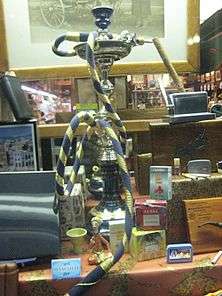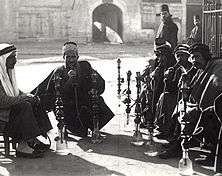Hookah lounge
The hookah lounge (also called a shisha bar or den, especially in Britain and parts of Canada, or a hookah bar) is an establishment where patrons share shisha from a communal hookah or nargile which is placed at each table.
Characteristics
Hookah lounges are mostly found in college towns and urban areas and are regarded by some as a novel and chic way to socialize and embrace multiculturalism.[1] Some people of Middle Eastern or South Asian extraction consider them a continuation of their own cultural traditions.

Often, hookah lounges are owned and operated by people from the Arab world, origin and or other regions where use of the hookah is a centuries-old tradition. Many hookah lounges incorporate such elements as Islamic decor and Arabic music or Indian music.[2]
Typically a disposable mouthpiece is provided for each user for hygiene reasons. Hookah lounges do not typically have liquor licenses but instead derive the bulk of their revenue from sales of coffee, tea, soft drinks and snack foods. Almost all offer Turkish coffee.
Some hookah lounges have well-equipped kitchens and are more akin to bistros. In the broadest sense, any restaurant or nightclub can be considered a hookah lounge if it offers patrons hookahs, shisha and a comfortable place to smoke. Some offer Middle Eastern cuisine menu items.
Due to several state anti-tobacco laws, many Hookah Bars have made the transition from smoking traditional shisha to smoking herbal shisha because it contains no tobacco, or nicotine and is legal indoors in areas specific to the prohibition of tobacco smoking. Herbs do produce tar when they burn.
History
The Hookah in its first and simplest form originated in India.[3] It soon traveled west to Iran, Turkey, and Egypt, where it gained mass popularity and are now the sites of some of the best quality hookahs in the world. The hookah lounge has clear antecedents in the tradition of coffee houses in the Middle East and Turkey, where people smoke tobacco from hookahs or other styles of water pipe provided by the establishment. In this traditional setting the hookah is typically of the single-hose variety. This is in contrast with the multi-hose variety favored in the hookah lounge and intended to emphasize the communal nature of the activity.
In Europe
- Germany - Hookahs are available in many establishments in Germany, particularly in Berlin, Cologne and the Ruhr Area and areas, and it is not only popular amongst Turkish people.
- Netherlands - Hookahs are now gaining popularity in the Netherlands, particularly in Rotterdam and Amsterdam.
- United Kingdom - In the United Kingdom, hookahs are most commonly found in "shisha bars" run by Lebanese, Pakistani or Egyptian people. Since a 2007 British ban on smoking in public places, Shisha bars have risen from 179 in 2007 to 556 in 2012. Birmingham also has a large number of Shisha lounges also such as Shabbi Shics in the Digbeth area of town.[4]
- Spain - Hookah use has grown in popularity in Spain, especially among the young. As a result, many teterías (tea houses) have made hookahs available to patrons.
- Russia - due to heavy influence from Caucasus and Central Asia, hookahs have become a widespread recreational practice in large Russian cities, and are now offered in many cafes and restaurants.
In the United States
In the United States, establishments akin to hookah lounges first opened decades ago in the immigrant quarters of New York City and Los Angeles, California as coffee and tea houses. The Hookah was not the central focus of the businesses until the Hookah Lounge in Las Vegas featured it as the primary offering. Patrons were typically men of Middle Eastern descent. The first establishment to call itself the Hookah Lounge, is in Las Vegas, Nevada. The Hookah Lounge created the entire experience of the Hookah, specialty cocktails and Middle Eastern food. The decor is Moroccan. They registered the name in 2000 and began using the URL Hookahlounge.com. They have two locations in Las Vegas. It was the first full service bar that focused its business around serving hookahs. The Hookah Lounge in Las Vegas was opened in 2000 by owner Paymon Raouf and operator Jeff Ecker. The term Hookah Lounge is now deemed as a generic name for places that sell the Hookah experience. The Hookah Lounge in Las Vegas originally defended the use of the name Hookah Lounge but it became too commonly used and too costly to defend. They now use the term America's Original Hookah Lounge in advertisements to better identify them as the first to operate in a major lounge setting.
Many hookah lounges in the United States have chic or modernistic elements such as glass tables, plasma televisions, and oxygen bars. Most bars in the U.S. require patrons to be at least 18 years of age to smoke shisha and 18 years of age to purchase (exceptions are Utah, Arizona, Alabama, and New Jersey: 19 years of age to smoke); however, the laws in some other states require the patron to only be 18 years of age to purchase or possess tobacco, which in a hookah bar, the patron is doing none of these; therefore, one is likely to find under age teenagers in many hookah bars in the United States.[1]
One purveyor of hookahs and shisha claims:
It's at its largest demand ever in this country...I don't think it's going away anytime soon. There's so much more room for the product to expand. Only a small percentage of Americans know about it.[1]
Over the recent years hookah in general has become increasingly popular for the young-adults; those who are just at the legal age to smoke in their state. It is not uncommon now to find hookah bars within short distance of college campuses and in the surrounding towns. This younger generation has revitalized the hookah market, hookah bars are successful and remaining open despite indoor smoking bans. For private hookah smokers, many Middle Eastern and Mediterranean markets now offer hookah products for sale.
Smoking bans and exemptions
Hookah use has increased dramatically among American and European youth in recent years because of the social atmosphere it creates, and because many young adults believe hookah is a safer alternative to cigarette smoking; therefore, they do not fully understand the health effects that come along with it.
Many municipalities, especially in North America and Europe have enacted smoking bans in public places. Sometimes, however, businesses can obtain special permits allowing smoking within; these permits are typically available only for hookah lounges, cigar bars, tobacconists, and similar establishments where smoking is the focus of activity. They are less frequently available for places in which alcohol or food is served.
In some cases, the ban is against tobacco smoking specifically. When this is the case, a hookah lounge may remain in business by replacing traditional, tobacco-based shisha with a tobacco-free Mu‘assel.
In order to remain open, many hookah lounges cannot sell food or beverages. Approximately 90% of the cities that have put a ban on smoking in public places have exemptions for hookah lounges. The cities with these kinds of exemptions, typically, have more dense populations.[5]
Public health concerns
Because hookah lounges are exempt from the smoking bans, and because the hookah trend is increasing at a high rate among youth, many believe it is becoming a public health concern. Many hookah users do not understand the health risks that come along with it. Common beliefs include hookah smoking contains the same chemicals found in cigarettes, it is not safer because it is smoked as often, it is addictive, and even if the tobacco is filtered with water, the carcinogens are not filtered out.[6] [7] For this reason, many cities want to create tougher restrictions for hookah lounges, and some want them shut down altogether.
References
- 1 2 3 Hookah bars finding a place in America
- ↑ East bay:Aromas, relaxation are the hook
- ↑ http://article-niche.com/launch/25-08-2008History-Of-Hookah.htm
- ↑ http://www.economist.com/news/britain/21583997-young-british-asians-have-adapted-arab-tradition-hubble-bubble Shisha lounges: Hubble, bubble
- ↑ A, Primack B. "US Health Policy Related to Hookah Tobacco Smoking." National Center for Biotechnology Information. U.S. National Library of Medicine, 24 July 2012. Web.
- ↑ Morris, Daniel S., Steven C. Fiala, and Rebecca Pawlak. "Opportunities for Policy Interventions to Reduce Youth Hookah Smoking in the United States." Centers for Disease Control and Prevention. N.p., 15 Nov. 2012. Web. 01 Apr. 2013..
- ↑ Channick, Robert. "Hookah Lounges Thriving, Three Years after Smoking Ban." Chicago Tribune. N.p. Web.13 Apr. 2011.
Further reading
- "Putting a Crimp in the Hookah" article by Douglas Quenqua in The New York Times May 30, 2011
